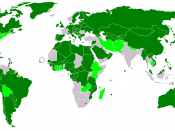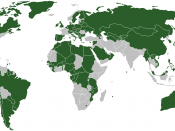Work-in- progress
Dean Maxwell & Isle Cohen Doctoral Seminar in International Law Hans & Tamar Oppenheimer Chair in Public International Law
Faculty of Law, McGill University
IMPLEMENTATION OF INTERNATIONAL LAW IN INDIA:
ROLE OF JUDICIARY
By Dr. Sunil Kumar Agarwal
Abstract
The effects of international law on the domestic legal order on various countries of the World are
manifold. In countries which follow "monistâ school, international treaties can be invoked before or applied by the judiciary. These are so-called self-executing treaties. On the other hand,
countries like India follow the "dualistâ school of law in respect of implementation of international law at domestic level. Therefore, in India, International treaties do not automatically form part of
national law. They must, where appropriate, be incorporated into the legal system by a legislation
made by the Parliament.
Indian Judiciary, though not empowered to make legislations, is free to interpret Indiaâs obligations under international law into the municipal laws of the country in pronouncing its
decision in a case concerning issues of international law. In this respect, the Indian judiciary has
played a proactive role in implementing Indiaâs international obligations under International treaties, especially in the field of human rights and environmental law. This paper examines the
role of Indian judiciary in the implementation of International law in India in the context of
relevant constitutional provisions.
I. INTRODUCTION
Entering into international treaties and agreements is one of the attributes of State
sovereignty. 1 Though International law requires a State to carry out its international
obligations undertaken by it by ratifying international treaties, but it does not govern the
process of incorporating international law into municipal law. In fact, the States follow
11
The principle of sovereign equality as embodied in the UN Charter is the cornerstone of the international
relations between the States.


